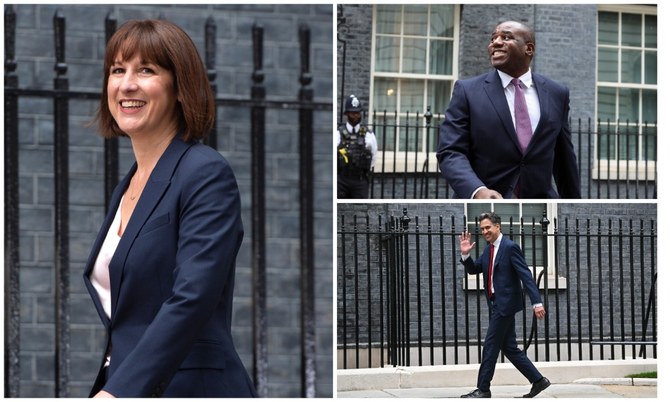LONDON: Labour’s David Lammy becomes Britain’s next foreign secretary pledging to reset relations with the European Union and push for a ceasefire in Gaza, while seeking to build ties with Donald Trump’s Republican Party.
The center-left Labour Party won a landslide victory in Thursday’s parliamentary election, ending 14 years of Conservative government and vowing to bring change to Britain.
While the six initial priorities promised in its election manifesto focussed on domestic matters, a long list of international issues awaits Lammy in his in-tray.
Labour has said long-term peace and security in the Middle East would be an immediate focus. It has committed to recognizing a Palestinian state as a contribution to a renewed peace process which results in a two-state solution.
Lammy, 51, traveled widely before the election, particularly to the United States, where he has been working to build ties with Republicans, after once writing in Time magazine that Trump was a “woman-hating, neo-Nazi sociopath.”
He has met Republican figures seen as candidates for roles in a Trump cabinet, including Mike Pompeo.
Lammy has strong links with leading Democrats and is a close friend of former President Barack Obama, a fellow Harvard Law School alumni.
COMMON CAUSE
In a speech during a visit there in May, Lammy said Labour would always work with the United States “whatever the weather and whoever wins” and he would seek to find “common cause” with Trump.
“I do not believe that he is arguing that the US should abandon Europe. He wants Europeans to do more to ensure a better defended Europe,” he said.
“Were his words in office shocking? Yes, they were. Would we have used them? No. But US spending on European defense actually grew under President Trump, as did the defense spending of the wider alliance, during his tenure.”
Lammy, the son of Guyanese immigrants, represents an inner-London constituency and has spent much of his political career campaigning for social and racial justice.
He supported Britain remaining in the European Union in the 2016 referendum. While Labour has promised Britain will stay outside the bloc, it wants to reset the relationship and seek to deepen ties, including through a new UK-EU security pact.
Lammy has previously described Marine Le Pen, a leading figure in France’s far-right National Rally (NR), as xenophobic and malevolent. Polls show her party is on course to win the most seats in the French parliamentary election but fall short of an absolute majority.
“France is one of Britain’s closest allies and we will work with whoever is elected. It is a democracy and it is up to the French people who governs them,” Lammy told reporters earlier this week. “We will wait to see what happens in the second round on July 7.”
FIRST FEMALE CHANCELLOR
Rachel Reeves became Britain's first female finance minister on Friday, and the one-time junior chess champion's opening gambit will be to try to spur growth without sacrificing the party's newly minted image of fiscal responsibility.
A former Bank of England economist, Reeves, 45, was tasked in opposition with mending relations with the business community that were strained under left-wing former Labour leader Jeremy Corbyn, and pitching to voters that the party could be trusted with their money.
Appointed as Labour's finance policy chief in 2021 after a tricky start to new prime minister Keir Starmer's leadership, she has become synonymous with his approach of putting pragmatism ahead of ideology, and facing down those on the left who want a fiscally looser approach.
With Labour's dominant election victory confirmed on Friday, she will now have to navigate a tricky fiscal picture and boost growth quickly if promised increases in investment are to be delivered without tax rises.
She said it was the “honor of my life” and a “historic responsibility” to be the first woman to be appointed Chancellor of the Exchequer, as Britain's top economics and finance policymaker is titled.
“We've waited a long time to have the chance to serve our country. We have got a credible plan now to deliver the change the country needs. Growing our economy is at the heart of doing that," Reeves told reporters on the sidelines of the party's manifesto launch in Manchester.
“The opportunity to be Britain's first female chancellor of the exchequer - that would give me immense pride, but also give me a huge responsibility: to pass on, to our daughters and our granddaughters, a fairer society. That's what I'm determined to do.”
Yvette Cooper becomes interior minister, known as home secretary, overseeing domestic security and policing.
Ed Miliband, who becomes Energy Security and Net Zero minister, led Labour into the 2015 election, which the party lost by an unexpectedly large margin that triggered his resignation.
He has since rebuilt his political career around environmental and climate-related issues.
Miliband will play a central role in delivering Labour's plan to make Britain a “clean energy superpower” through the creation of a publicly owned energy company with powers to invest in new green projects alongside the private sector.
Angela Rayner, who Starmer appointed as his deputy prime minister, will also serve as secretary for levelling up, housing and communities.
* With Reuters, AFP and AP


























